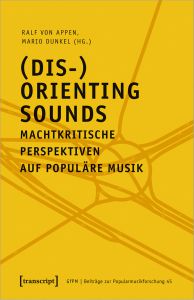(Dis-)Orienting Sounds. Machtkritische Perspektiven auf populäre Musik. Sammelband zur 28. Arbeitstagung der Gesellschaft für Popularmusikforschung (GfPM), Hg. Ralf von Appen und Mario Dunkel
Wenn bewusste und unbewusste Orientierungen grundlegende Funktionen menschlichen Erlebens sind, so können Klänge „gleichzeitig Antrieb und Gegenstand von Orientierungs- und Desorientierungsprozessen sein“. Inspiriert von Sarah Ahmeds Queer Phenomenology (2006) wollen die Herausgeber des Tagungsbandes (Dis-)Orienting Sounds macht- und kontrollkritisch herausstellen und hinterfragen, wie populäre Musik ein Medium für verschiedenartige Orientierungen sein kann.

Dieses Ziel wird im Großen und Ganzen von den dreizehn Aufsätzen, die übergeordnet in musikpädagogische, intersektionale und wissenschaftsspezifische Perspektiven gegliedert sind, erfüllt. Der Band bietet anregende Einblicke und Überlegungen zu einem breiten Spektrum an identitätsbezogenen Orientierungen (von Gender über Ethnizität bis hin zu Posthumanität u. v. m.) und lässt drei generelle Neu- bzw. Zusatzorientierungen erkennen, die für die Popular Music Studies in Zukunft maßgeblich sein könnten und sich zum Teil gegenseitig bedingen.
Dies betrifft erstens den deutlich zu vernehmenden Ruf nach stärkerer Selbstreflexivität – sowohl in Bezug auf pädagogische Konzepte und Strukturen als auch auf das Forscher_innensubjekt. Zweitens machen einige der Beiträge augenscheinlich, dass Multidimensionalität in den Popular Music Studies keine bloße Worthülse (mehr) ist, sondern das Zusammenführen von verschiedenen Methoden, Perspektiven und Gegenständen mittlerweile oft selbstverständlich erscheint. Spürbar ist dabei drittens eine demonstrative Offenheit gegenüber bislang wenig genutzten Verfahrensweisen, wie beispielsweise biografischen Fallrekonstruktionen oder zirkulär angelegten Gruppeninterpretationen, und vor allem eine zunehmende Orientierung in Richtung praxeologischer Forschung. Gegenwärtige und vergangene sozial-kulturelle Praktiken, sei es in Online-Kommentarbereichen oder mit Blick auf mediale Technologien und Konzertlocations, werden in Beziehung zur Musik gesetzt, wodurch bedeutungsorientierte, textzentrierte Zugänge erweitert werden.
Inhaltlich besonders hervorzuheben sind meines Erachtens die Beiträge von Petter Dyndahl, Katharina Alexi und Peter Klose: Dyndahl macht am Beispiel des musikalischen Bildungssystems in Norwegen unter anderem sichtbar, wie die Aufwertung populärer Musik als „legitimate culture“ Prozesse der kulturellen Gentrifizierung mit sich bringen kann, Alexi stellt den ironischen „Sekundär- und Neosexismus“ und „Neo-Herrenwitz“ im deutschen Indie, Punk und Rap schonungslos bloß, und Peter Kloses auf situative Veränderungen ausgerichtete Analyse von Live-Musikveranstaltungen zeigt auf, wie eine alternative, an körperlich-materielle Aspekte orientierte Geschichtsschreibung populärer Musik auszusehen vermag.

